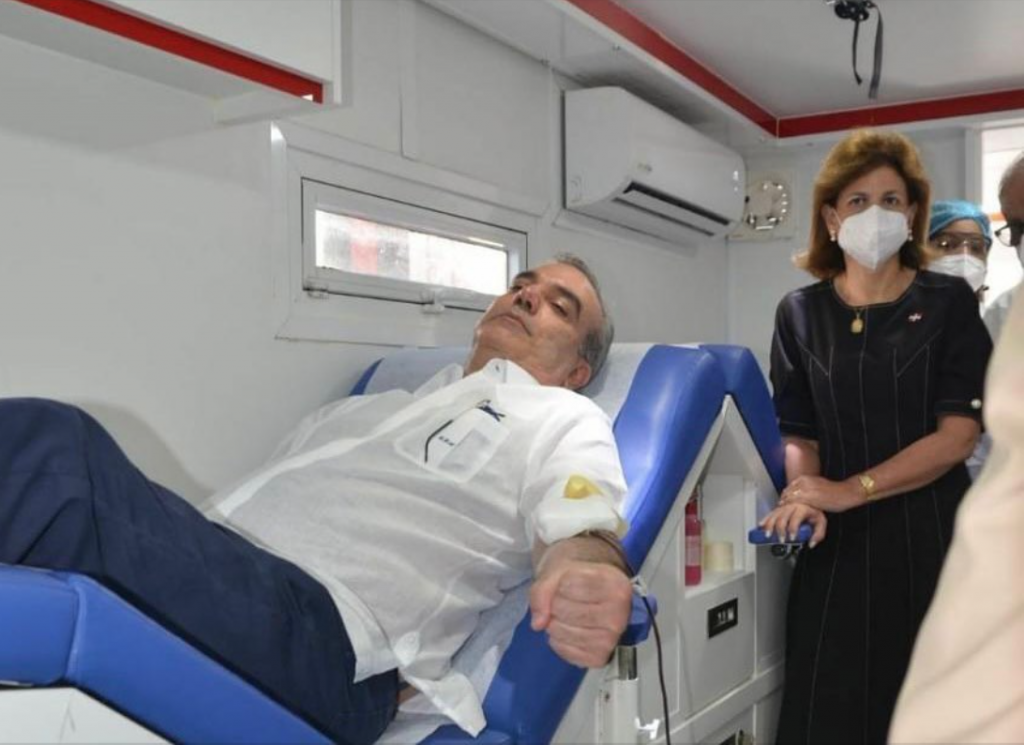
President Luis Abinader donated blood on 25 November 2021 and invited people here to do the same to save lives. He donated the blood in a mobile unit parked for the event in the front esplanade of the Downtown Center plaza, on Núñez de Cáceres Avenue. The President described donating blood as a gesture of love.
He stressed the need for blood donations for children with cancer, people with sickle-cell anemia, pregnant women and accident victims.
President Abinader says his office is working on the draft of a blood donor bill to be submitted to Congress to make the handling of blood transparent and a public good that is free for citizens. He said donating blood will always be voluntary but is an act of caring for other human beings. He said the bill seeks to turn the country into a truly efficient and effective donor network. “We, as the government, have an obligation to promote public policies that encourage people to donate, that guide them and facilitate the process, but we cannot force anyone to do so,” he clarified.
In addition to the event held at the Downtown Center, there were other blood donating activities simultaneously at National Hemocenter headquarters and at the Multipurpose Center of the Pontificia Universidad Católica Madre y Maestra in Santiago.
The National Blood Center (Hemocentro Nacional) and the Fundación Laso coordinated the effort. The Medina administration had inaugurated the national blood center three years ago but now is when it is opening to the general public. President Abinader is the first official blood donor.
The Hemocentro Nacional is making available mobile spaces, such as used by the President, to make donating blood an easy, safe, comforting and effective experience.
The National Hemocenter is located in Villa Mella in northern Santo Domingo open to all those who wish to donate blood in a disinterested manner.
The government acknowledges the Hemocentro Nacional is far from the center of the city, and is reaching out to donors, by organizing donation days through mobile units, equipped with air conditioning, the corresponding supplies and professionals in the area, ready to travel wherever required.
Blood donating events are being coordinated for the main headquarters of the Ministry of Public Health from 1 to 17 December and with the Adventists in San Cristobal on 4 December.
Also, at the Pedro Henríquez Ureña National Library on 22 January and at Bienes Nacionales on 28 March.
President Luis Abinader encouraged companies to get involved. “Motivate your employees to donate blood,” he said. The organization can set up a mobile blood donating effort in companies without the employees losing a day of work or leaving the premises.
Public Health Minister Daniel Rivera explained that in the Dominican Republic there are 99 blood banks where 115,000 units of blood are collected each year, an amount that does not cover the current demand, which should be 300,000 or 350,000 units.
He said the correct functioning of the National Hemocenter is important to satisfy the needs of the Dominican people and negotiations are being made for the installation of one in in Santiago to service the north of the country.
Rivera said that on 1 December, the Dr. Defilló National Laboratory will launch an effort whereby all people who wish to know their blood type and if they are eligible for donating blood can participate, free of charge.
The efforts are coordinated with the LASO Foundation. The executive director of the Blood Donor Network of the LASO Foundation, Lorenny Solano explains the donor network is not a blood bank, but a channel and motivator for people to donate and contribute to saving lives.
During the blood donating event, President Abinader was accompanied by Vice President Raquel Peña, who is the director of the Health Cabinet. Also attending was the director of the National Blood Center, Pedro Sing; the director of the National Health Service (SNS), Mario Lama; the director of the National Health Insurance (SENASA), Santiago Hazim; the superintendent of Health and Labor Risks (SISALRIL), Jesús Feris Iglesias, and the ambassador of Israel in the country, Daniel Biran.
Read more in Spanish:
Noticias SIN
N Digital
26 November 2021

